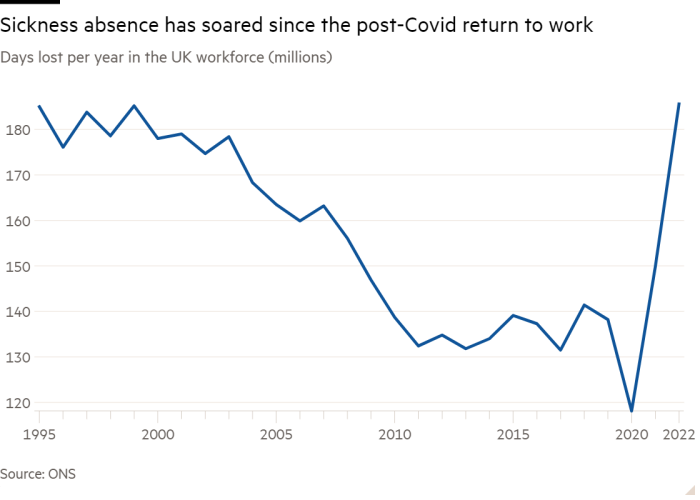Unlock the Editor’s Digest for free
Roula Khalaf, Editor of the FT, selects her favourite stories in this weekly newsletter.
Fixing the NHS to cut the number of days staff take off ill is top of business leaders’ wish list for the new UK government, according to a poll that highlights the growing problem to companies of sickness absence.
About 46 per cent of 1,000 business leaders said Labour should prioritise strengthening the health service “to ensure a healthy workforce and minimise absenteeism”, in a survey conducted by consultancy Savanta last month.
The issue was significantly higher on their agenda than the other eight options listed in the poll, which allowed respondents to choose three. About 35 per cent of respondents, drawn from businesses of all sizes, said ministers should prioritise support for companies such as tax breaks, while 32 per cent backed simplifying regulation.
Sickness absence has surged since the pandemic: a record 186mn working days were lost to illness in 2022, the latest year for which data is available, according to the Office for National Statistics.
NHS waiting lists have also climbed since Covid-19 struck, with 7.6mn treatments outstanding in England in the final months of the Conservative government, which Labour defeated in a landslide election win on July 4.
The strain on the taxpayer-funded health service has encouraged more companies to intervene, driving record take-up for employer-funded health insurance policies that are increasingly using services such as virtual GPs to address employees’ problems earlier.
Sir Keir Starmer’s government described the NHS as “broken” on its first day in office and has made building a service “fit for the future” one of its five “missions”. Last month it reached a pay deal with junior doctors to end a long-running series of strikes that hit hospital provision hard.
On the back of pressures in the NHS and primary care, insurers have reported a rise in demand from businesses for policies that cover hospital care alongside offering virtual GPs, physiotherapy, talking therapies and other services.

A record 4.4mn workers in the UK had health cover through their employer’s scheme in 2022, according to the latest figures from the Association of British Insurers trade body. Others have access to private health services through so-called group income protection policies.
Yvonne Braun, ABI policy director for pensions, health and protection insurance, said employers taking up preventive healthcare services were acting out of “enlightened self-interest”.
“If you can do a lot of prevention and keep people in work and healthy in work, you can create a virtuous circle that helps everyone,” she said, adding that there was room for “more of a partnership approach” between employers and the state on workforce health.
Mark Southern, sales and marketing director at insurer WPA, said businesses were seeking faster treatment from private providers “so a small problem doesn’t become either short-term or long-term sickness”.
He cited musculoskeletal conditions, such as a pulled back, where companies were keen to provide a short-cut to physiotherapy treatment, and higher demand for mental health services.
The cost of absence to bosses is set to rise as Starmer’s government plans to make statutory sick pay available to more employees as part of a major package of worker rights’ reforms.
Labour’s “Plan to Make Work Pay”, which the party has promised to reflect in draft legislation within its first 100 days in office, will include a right to receive sick pay from day one of an illness, down from the current three-day waiting period.
About 51 per cent of respondents to the Savanta poll, conducted between July 10 and July 24, said they were “optimistic” about the impact of the new government on the UK economy, with positive sentiment reaching two-thirds among medium-sized to large businesses.







